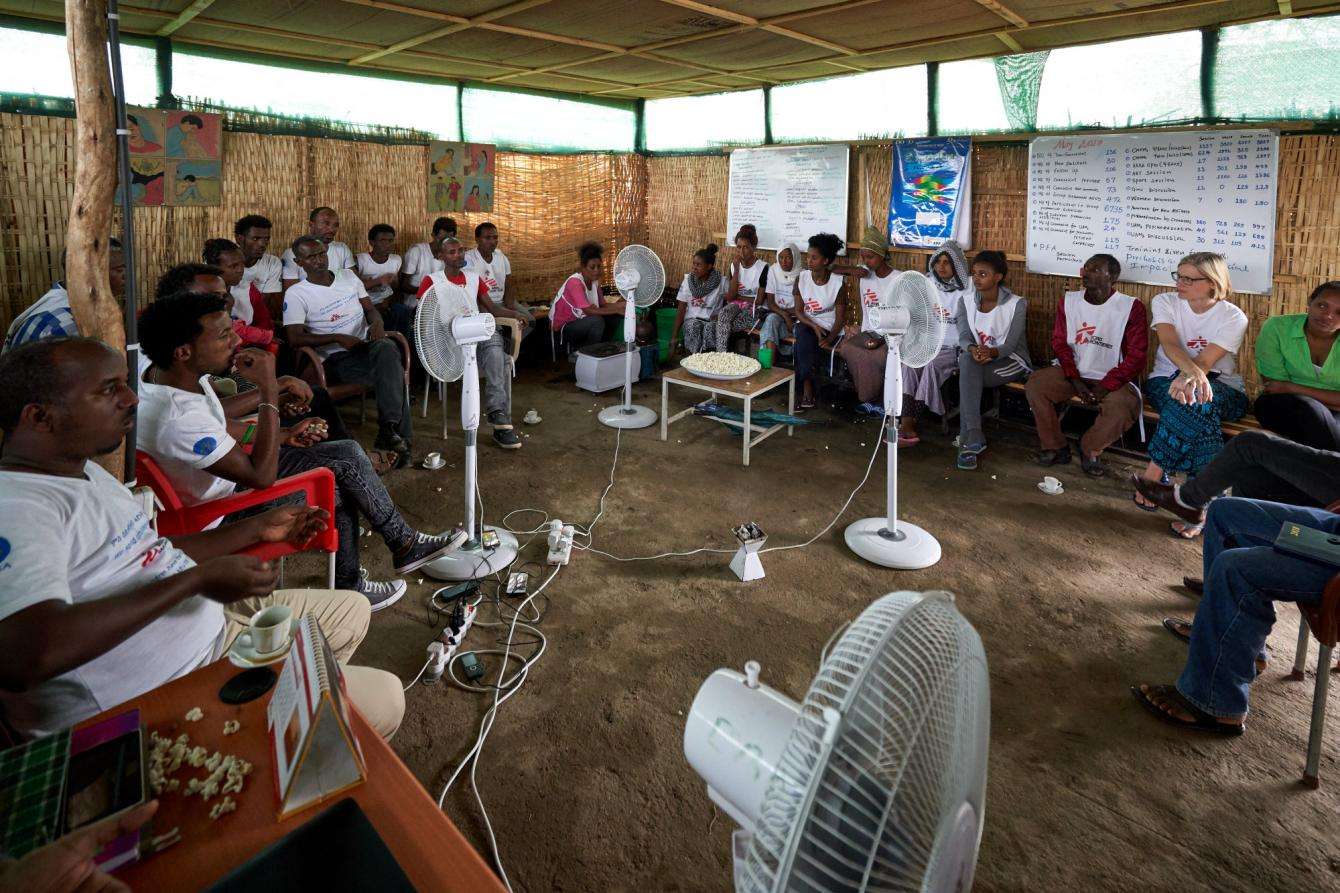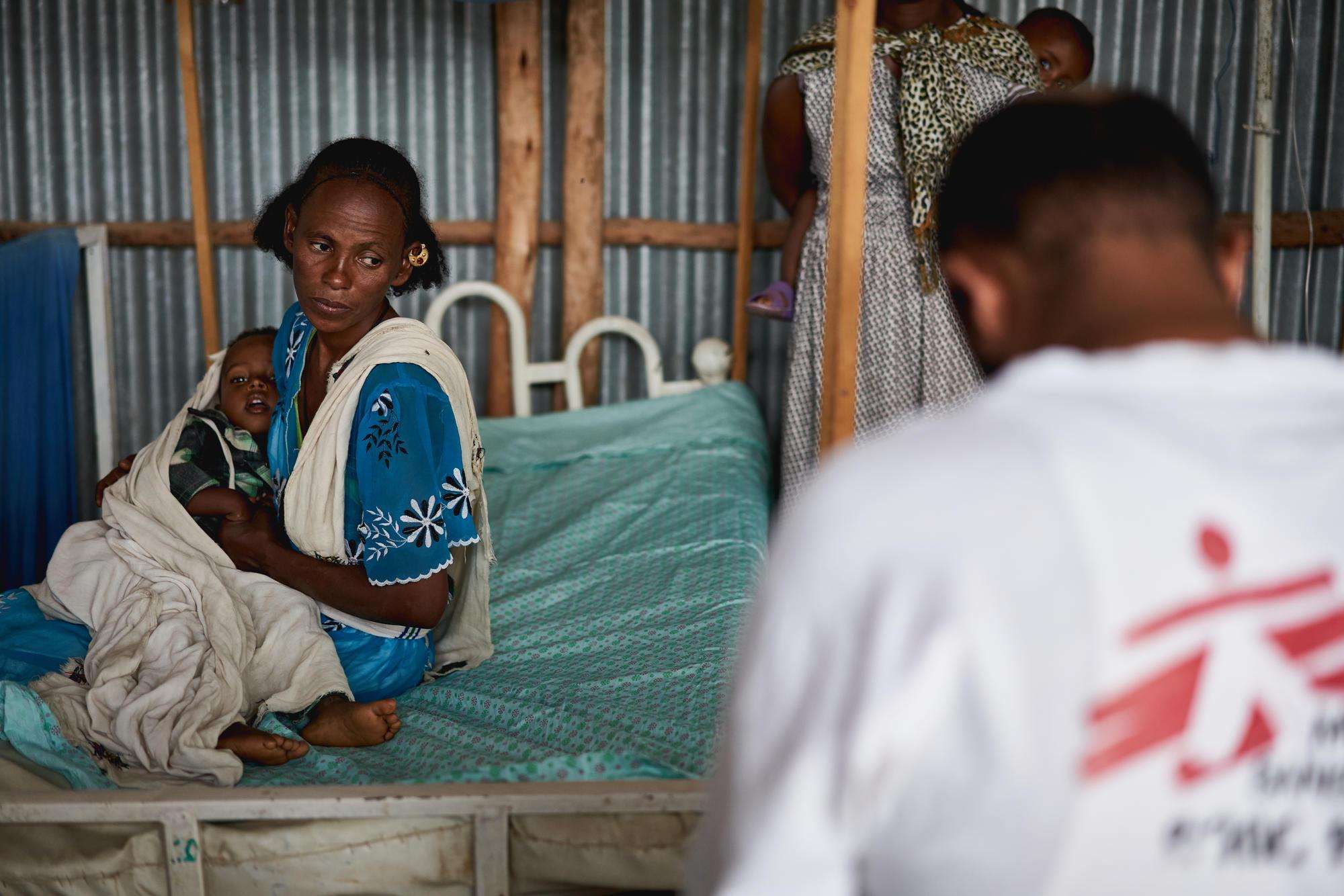Eritrean and Ethiopian leaders declared an end this week to the longstanding conflict between their two countries. Among the many questions still to be addressed is what the future holds for hundreds of thousands of Eritrean refugees, many of whom have fled extreme hardships and mandatory indefinite military service. Doctors Without Borders/Médecins Sans Frontières (MSF) provides mental health care in camps in the Tigray and Afar regions of Ethiopia, where many Eritreans arrive after escaping suffering in their country. Here are some their stories.
Ephraim is in one of the small counseling rooms of the MSF mental health center in Hitsats refugee camp in northern Ethiopia. Being able to share his story while remaining emotionally stable is an important step in his therapeutic process.
“I was studying in ninth grade, and I knew that I had to do military service soon. For some people it never ends and while you are in the military they pay you almost nothing,” he says. “For me it was clear that I did not have a future, not a future where I could freely choose what to do and be, and where I could provide for my family. So I decided to leave, like many other Eritreans,” he adds.
Ephraim was only 14 years old when he left Eritrea. With very little food and water, a long 13-day trip across the desert almost killed him. Then, while attempting to reach Libya, he was detained in Sudan. He was beaten and jailed for several weeks before being sent back to Eritrea where he was imprisoned again.
Fleeing Eritrea
Each month, approximately 5,000 people flee Eritrea. Many of them are teenagers like Ephraim. The mandatory indefinite military service imposed on all Eritreans by an oppressive regime that deprives them of basic human rights is a major push factor for those who flee the country. For those who stay, the ”choice” is not without cost: arbitrary detention, violence, and intimidation are used against those who do not conform to the system.
The prison in Eritrea was like a hole in the ground, with no windows and no lights. There were more than 80 people in the room with me. We didn’t have enough space to lie down so we spent every night sitting and taking turns to sleep.
—Ephraim
When Ephraim was released from prison thanks to his mother's intervention, he tried once again to leave Eritrea.
“The soldiers caught me at the border, beat me up badly, and sent me back to prison. The injuries from the beating were getting worse. I started coughing, and I couldn’t sleep because the floor was too hard and painful. I did not receive any medical help until things became pretty bad. At that point I was sent to the hospital. I was treated and sent back to the prison,” he recalls.
Ephraim was eventually freed and made a third attempt to flee the country, this time reaching the refugee camps in northern Ethiopia. He is now 17 years old.

Need for mental health
Many other Eritreans have gone through similar ordeals. Their experiences can have physical as well as psychological consequences, and the mental health issues are often far more complex to identify and treat. In order to provide more comprehensive health care for refugees, MSF started a mental health project in 2015 for the Hitsats and Shimelba camps. With around 2,300 new monthly arrivals, refugee camps in northern Ethiopia are one of the first destinations for Eritreans leaving their country.
Robel Araya, MSF mental health supervisor in Hitsats camp, is very familiar with the situation faced by Eritrean refugees.
“Most of the people that we see in the camps have been through traumatizing experiences. Leaving Eritrea is dangerous, and some of them tried several times before succeeding. Many develop depression, anxiety, and post-traumatic stress disorder linked to torture, violence, and abuse. These conditions have a very negative effect on their lives. Our mental health services can help them get back on their feet,” he says.
MSF offers counseling, inpatient and outpatient psychiatric care, and a wide range of therapeutic activities where patients can discuss what they are going through and receive detailed information about their conditions and how to overcome them. Realizing that other people are experiencing similar problems helps them feel less isolated.
As in most humanitarian settings, children are among the most vulnerable groups.
“Around 40 percent of the camp population is under 18. Half of them are traveling alone or have been separated from their families. Their situation is very delicate. They tend to suffer from separation anxiety, and in some cases they had difficult or confusing early sexual experiences. Here we have activities specifically designed for them, like sports, drawing, and theater sessions, as well as specialized counseling,” Robel Araya says.

Challenges to providing care
The population in the camps is quite transient. It is estimated that around 80 percent of Eritrean refugees will continue the journey through Sudan and towards Libya along the Central Mediterranean route within a year of their arrival in the Ethiopian camps. Harsh living conditions in the camps, the lack of future prospects, the desire to reunite with family members in other countries, and the average young age of the refugees all contribute to drive onward movement.
Our outreach activities in the community need to be constant because the population is always changing. The few who stay for the long term do so because they do not have the money for further movements. We also see people who tried to leave but were caught in Sudan or Libya, where they have seen and experienced horrible things, and were sent back to Ethiopia even more traumatized than before.
—Robel Araya, MSF Mental Health Supervisor in Hitsats camp
One of the main challenges is convincing people to seek support. The fear of being labeled as "weak" or "crazy" by the community prevents many from coming forward. “At first we encountered a lot of difficulties talking about mental health with refugees. So we decided to hire community mental health workers from the refugee community to provide door-to-door, culturally appropriate awareness-raising, education, and de-stigmatization of mental health,” he says.
Giving back to the refugee community
Every day, the community health workers go from shelter to shelter and explain how mental health issues manifest themselves, that treatment is available, and why it is important to seek help. These sessions usually involve a whole family at once, and are conducted in their native language. “Now we have a team of 26 very motivated community health workers. It helps that many of them are former patients and have experienced firsthand the benefits of counseling and treatment. Being Eritrean, they know how to properly address the topic with the rest of the camp’s population. Their commitment comes from wanting to help their community,” Robel Araya explains.
Simon* is one of MSF’s community health workers in Hitsats camp. Like other members of the team, he is an Eritrean refugee and a former patient. “When I first arrived in the camp, I was not doing well. I was constantly reliving all the things that I experienced when first trying to cross the border and while in jail, like the shooting, the torture, and the abuse. The counseling really helped me get my life back together, and I realized that this is something I could help other people with,” he says. “Working as a social worker in the MSF mental health program here in Hitsats camp is the only thing that gives me stability and motivation. Having a purpose has helped me to not think too much about further movements and the fact that I miss my family, my friends, and my home. A lot of people here suffer from trauma and mental health problems. When I see that they get better because of the support I provide through my work, I feel like staying here is worth it. Even if I didn’t manage to become a nurse like I dreamed in Eritrea, I am still able to help people and this makes me very happy,” Simon states proudly.
The ability to help other survivors of violence also motivates Hellen, a 30-year old mother who suffered rape and captivity in Sudan while trying to flee Eritrea. Now a refugee in Hitsats camp, she has seen her life improve considerably and she is able to take care of her children.
MSF gave me my life back. I am very thankful for this second chance to live again. I told myself that I could help others and that my experience would help me relate to them. So I went to the mental health supervisor and asked if there was anything I could do to help. That’s how I became a social worker in the MSF mental health team. In the future, I hope I will be able to keep on helping other survivors of violence, independent of where in the world I will be.
—Hellen
Hitsats and Shimelba refugee camps host respectively around 10,000 and 6,000 people. There, MSF provides around 2,800 individual counseling sessions and 3,600 psychiatric consultations per year. In addition to the mental health component, MSF offers primary and secondary healthcare services, including a 24/7 inpatient care in Hitsats refugee camp in partnership with the Ethiopian Administration for Refugee & Returnee Affairs (ARRA) and ambulance referral services for emergency patients to the nearby Shire hospital. Reproductive health awareness and HIV prevention are also provided at the community level.
*Name changed at the request of the interviewee to protect his identity.




